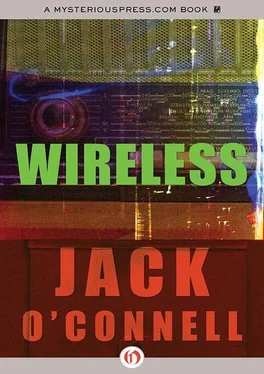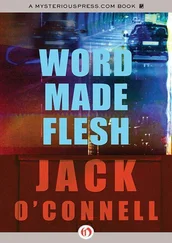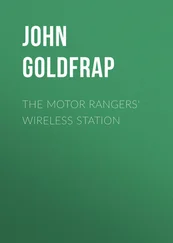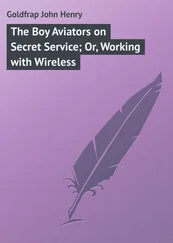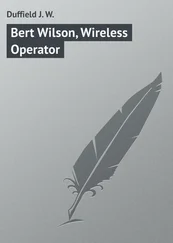Gabe wishes he could line everyone up, the whole jammer circle. Both factions. Even Wallace Browning and the old boys. Even Billy J, the little midget shithead. He wishes he could take on Flynn’s voice and relaxed confidence. He wishes he could mimic Hazel’s attitude and her courage. He’d even take Wallace’s knowledge of jamming history and the wisdom that comes with it. And he wishes he could put all these attributes together into a single lecture, one full-blown, attention-freezing speech of a lifetime.
He’d wake the jammers up. He’d speak slowly, but with force. And he’d never once stutter. He’d speak until they came to, until they saw the simplicity of his words. Until they gave up their chokeholds on all these specific, particular ideas, all this political and philosophical crap, all this art shit, and just started to think about the group, the people who sit elbow-to-elbow every night at Wireless. The crowd that he once heard Flynn call the family .
But Gabe’s only fifteen years old and he’s too confused to even begin understanding why everything feels like it’s falling apart at Wireless. He feels he shouldn’t be in this position, that as the youngest jammer, he should be exempt from the infighting. He should be cared for, looked after a little. He knows Hazel would be annoyed at thoughts like this. Maybe more than annoyed, more like ashamed. But this is how he genuinely feels, that a sense of place and belonging has to count more than a sense of independence. At least at fifteen, when every hormone in his body is pushing and prodding him and five times a day he feels like his head could tear loose from his shoulders and launch itself into orbit.
When Gabe was five years old, his old man left for a two-week hunting trip and never came home. The hunting buddy turned out to be a waitress named Denise. Gabe’s ma filed for divorce a year later and had to go back to night work as a projectionist at Herzog’s Erotic Palace. Gabe was raised by a string of impatient cousins and, now and then, hired sitters.
He tries not to think much about his father these days. He tries not to think about what a normal childhood might have been like. He tries to focus on Wireless — how he can learn from Flynn. How he can be of help to Hazel. He knows his feelings for Hazel are, at best, unrealistic. But how do you turn off a crash of this magnitude? How do you simply will yourself not to care?
Gabe looks across the room to Flynn, still seated in the brass and red leather confessional, whispering calming words into the ear of a weeping young woman.
A regular named Chatman comes up behind Flynn and says into his ear, “Ferrie wants to see you in the basement,” then moves away quickly.
Flynn wades through the crowd to the front of the club, slides behind the bar, unlocks the cellar door, and starts down the stairs into the dim and musty air below. Immediately, the environment changes. The walls at his side are now rough and bulging natural boulders mortared together and caked with a century’s worth of silt and soot. The stairs beneath his feet are an ancient, creaky wood. And even the air seems to come from some decay-plagued era that everyone’s forgotten.
Coming off the bottom step, Flynn plants his foot in a pool of cold water and lets out a fast, overly loud, “Shit.”
From somewhere deeper in the basement, Ferrie yells, “It’s flooded a little.”
“Timely advice,” Flynn mutters.
“Who’s there?” Ferrie calls.
“Thought police,” Flynn yells. “We’ve got your mother. Come out slowly.”
“Senor Flynn,” Ferrie yells back. “I’m down with the antiques.”
Flynn doesn’t know how the man can spend so much time in this cellar. Every time Most sends him down for a crate of vodka, he disappears for an hour. Flynn thinks of the cellar as an enormous tomb, a dank mausoleum that seems to fill with water every time it rains. The cellar is divided into dozens of chambers or “vaults,” as Ferrie tends to call them. There’s a wide center aisle that runs from the front of the factory to the back, unobstructed, then dead-ends into a woodshed area that spans the width of the building. Off this center aisle are small rooms, little storage areas partitioned by scrap wood and sometimes chicken wire. Most of these storage chambers are empty, but a few are still crammed to capacity with crates and cartons and naked bales of rolled wire, ancient stock and supplies abandoned by the factory’s owners when the place went under.
Flynn moves to the first vault and looks in. Under the glare of a mesh-caged light bulb, hanging from a hook in the rafter above, sits Ferrie behind a long redwood picnic table. He’s seated in an old-fashioned wooden swivel chair that tilts to one side. His feet are propped up on a slotted crate to keep them out of the puddle of water beneath the table. Behind him, mounted on the wall, is a large Peg-Board fitted with old fuse boxes and newer circuit breakers — the electrical wiring for the whole building. The table itself is covered with an eclectic selection of antique radios. Flynn spots Philcos and Farasworths, Crosleys and Stewart-Warners, and at least one old Fairbanks-Morse that he’d guess dates from the late thirties.
Flynn tiptoes deeper into the room until he finds a dry mound of earth to stand on. Then he just digs his hands into his pants pockets and smiles at Ferrie.
Ferrie has a cheap red plastic fishing tackle box open in his lap. It’s filled not with lures but with small hand tools, tweezers and small pliers and wire strippers. A half dozen other tools are scattered on the picnic table around the old radios. And, unbelievably, in the midst of a hundred years’ worth of dirt and soot, there’s a spray can of Lemon Pledge furniture polish and a thick chamois buffing cloth.
Flynn puts his hand to his forehead and says, “Ferr, if you love these units so much, why do you leave them down here in this rat hole?”
Ferrie stares at him for a few seconds and finally, in a whisper, says, “Usually no one but me comes down here.”
“Yeah, with good reason.”
“It’s not so bad when you get used to it. Pretty peaceful, really.”
“That’s the last word I’d go for. I hate it down here.”
“Rough on the suits?”
“We had a basement like this where I grew up. I was in it all the time. It took in water, just like this place. God, the smell down here …”
“Why’d you go in the basement if you hated it?” Ferrie asks.
Flynn ignores him. “I heard you wanted to see me. Good news or bad? I already talked to Hazel. I put out the fire—”
“Good news. Interesting news.”
“You got another lead for me? That liquor salesman was a dog, you know. I bought the geek a steak down at Winchester’s, he tells me over dessert he’s looking for cheap term but no one will write him ’cause this genetic heart thing—”
“Forget business, G.T. She’s in here. Tonight.”
“She?”
Ferrie gives up a self-satisfied nod.
“Who’s in here tonight?”
Ferrie closes his mouth, lets a smile cut larger across his face.
Flynn comes upright, furrows his brows, gives a “get out of here” mock-annoyed grin.
“Five minutes ago. Most was behind the bar. Woman comes in. Not a regular. Never seen her before. Very stylish. A presence. She orders a mescal. Bang. The voice. Most almost falls over. She gives him a look— don’t give me away, help me out here . He swears to me it’s her.”
Flynn’s heart speeds up. “Where is she?” he says.
Ferrie shrugs. “Took the drink and blended into the crowd. Most is already starting to doubt himself. You know how that happens. You’re sure of something and then five minutes later you’re not.”
“What direction did she go in?”
Читать дальше
